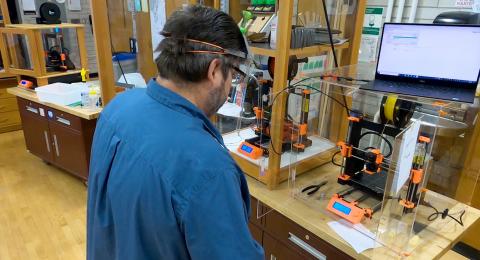College partners with CiTi BOCES, Exelon and Novelis to produce face shields
Office of Communications and Marketing
Published
Educators from SUNY Oswego are putting their skills toward supporting a critical need during the COVID-19 pandemic -- producing protective face shields for healthcare workers and first responders.
SUNY Oswego faculty members Daniel Tryon of technology education and David Dunn of biological sciences partnered with Tracy Fleming of CiTi BOCES to start production in late March. They all had similar ideas to help and joined forces.
“How do we get as many of these face shields produced as possible?” they wondered, Tryon said. They developed 60 face shields with an original prototype, then the National Institutes of Health -- in collaboration with the U.S. Food and Drug Administration, the Veterans Healthcare Administration and America Makes -- posted suggestions for 3D printers that encouraged builders to include a roof on the top of shields, Tryon noted.
“I decided to turn over the 60 that we had to Tracy so he could take them to the local group that approved them, but to completely switch production here to the new design,” Tryon said. “This latest version is fantastic. This is a model that has actually been clinically tested by NIH.”
The team produced 185 shields as of April 1 but continue to ramp up production. “The 3D printers are the slowest process but we have more than doubled production rates so far and should be able to produce about 93 per day going forward,” Tryon said.
On the SUNY Oswego campus, Tryon is using 3D printers in Park Hall’s technology lab to print the frames, and is cutting lenses out of polycarbonate. Dunn then takes the parts to finish and sterilize them in ovens in a Shineman Center lab.
“I am participating in the design and testing process to produce shields that will provide maximum protection while being easy to use,” Dunn said. “I will also be disinfecting and packaging shields prior to their being sent out for use.”
Fleming, a SUNY Oswego graduate and data coordinator for CiTi BOCES, was instrumental in starting the project and partnering with the Oswego County Health Department. He also has been working tirelessly on fabricating shields as well.
“We are partnering from another facility that is actually all the way out in Auburn,” Fleming said. “The facility is the maker space belonging to Cayuga-Onondaga BOCES.”
The ones being made at SUNY Oswego are being shared with the Oswego County Emergency Management office for dissemination to healthcare and first responder agencies, as well as to on-campus Health Services, University Police and the college's agricultural and testing analysis laboratory at the Port of Oswego Authority.
“We’ve been working with the health department and some other healthcare providers, and they seem to really like it,” Tryon said.
Local industry partners Exelon and Novelis have stepped up to help with production. Exelon is providing 18 face shields per day, and growing, Tryon said, while Novelis has helped with providing filament.
Because maintaining material to continue manufacturing can be a challenge, participants are reaching out to those who might have 1.75 mm PLA filament to donate. Those able to provide this kind of filament can email daniel.tryon@oswego.edu.
All participants appreciate the opportunity to help those working on the front lines of battling the pandemic.
“It's been widely reported that healthcare resources are stretched extremely thin in response to the COVID-19 pandemic,” Dunn said. “Personal protective equipment (PPE), including face shields, are among the equipment facing critical shortages. While we hope and expect that nationwide production of medical equipment will soon ramp up, we felt that in the interim, we could help to fill the gap.”



